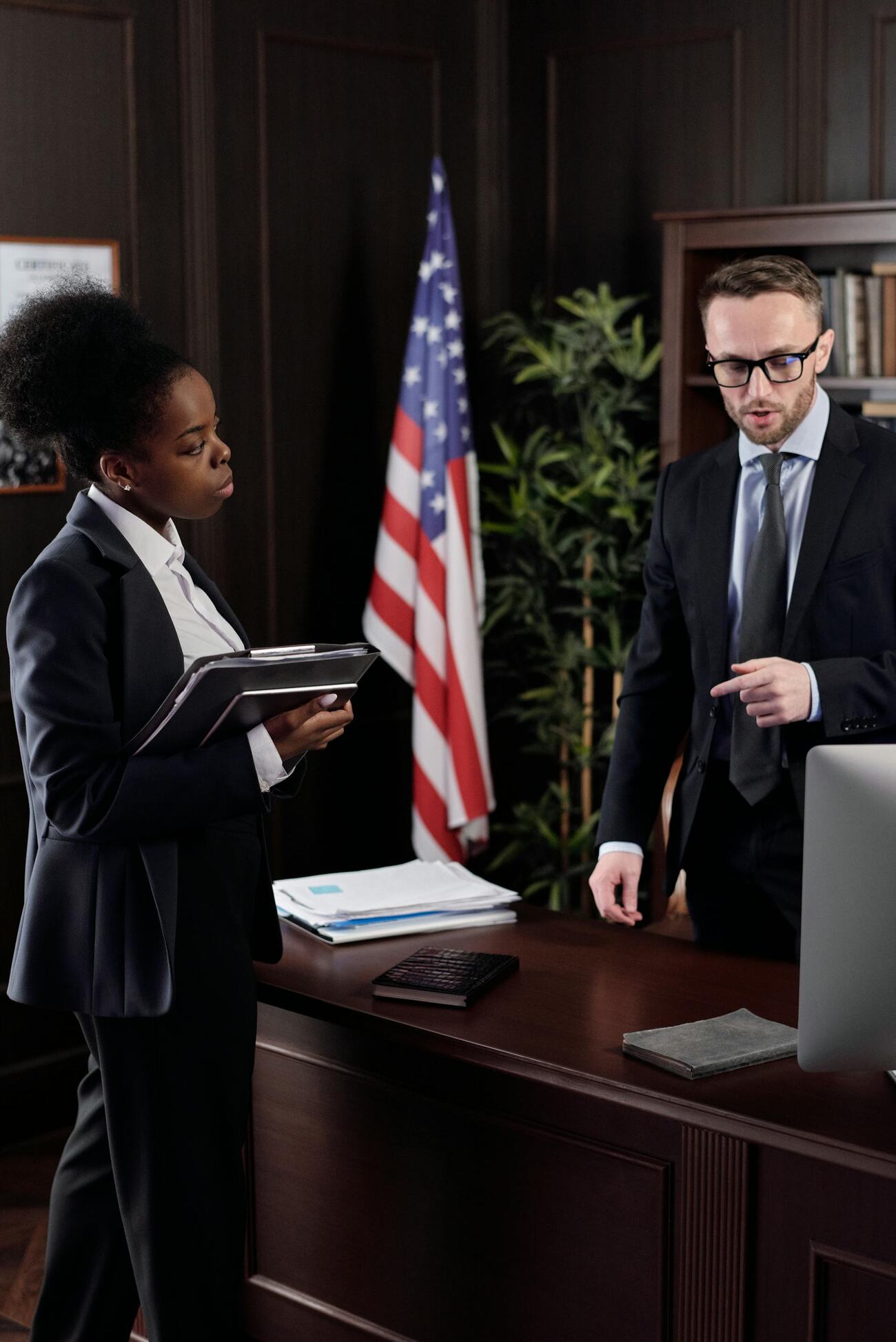Even the most experienced attorneys risk appearing uncertain, losing audience attention, and ultimately compromising case outcomes that could have been won with more compelling vocal delivery. With our vocal techniques for courtroom presence for lawyers, you can hone your skills to persuade judges and juries to win legal proceedings.
How Lawyers Can Use Voice to Strengthen Courtroom Presence
Courtroom speaking skills for lawyers start with foundational elements like breath and posture support, and optimizing pitch, volume, and resonance. Lawyers can establish a powerful vocal presence with dynamic delivery and strategic communication techniques, including pacing, storytelling, and empathy. Collectively, these elements promote a more influential connection with the courtroom.
 Strong courtroom communication depends on how you use your voice, control your tone, and adapt your delivery to the situation. Learn simple techniques in using voice to project authority, clarity, and confidence in the courtroom.
Strong courtroom communication depends on how you use your voice, control your tone, and adapt your delivery to the situation. Learn simple techniques in using voice to project authority, clarity, and confidence in the courtroom.
1. Create a Strong Vocal Foundation
Developing these foundational elements can help strengthen your voice to communicate with confidence and make your presence known in courtrooms.
Mastering Breath Support and Posture Control
Proper breath support and posture enable you to project your voice effortlessly and maintain a steady, controlled delivery, preventing strain and fatigue during long proceedings.
- Stand with purpose, as good posture opens your chest to project an air of confidence.
- Breathe from your diaphragm by placing a hand on your stomach to feel it expand and contract, which provides a steady supply of air and prevents a weak-sounding voice.
- Practice vocal warm-ups like lip trills to strengthen breath control and prepare your vocal cords for extended use.
Optimizing Pitch, Volume, and Resonance
This combination of elements enables you to create a dynamic and impactful presence, captivating the jury and judges with a rich, authoritative voice.
- Lower your voice to draw the listener in, creating an intimate moment, and raise it slightly to project a bold tone that commands attention.
- Opt for a lower pitch to convey gravity and authority, or a slightly higher pitch to express enthusiasm or highlight a critical piece of information.
- Improve resonance by speaking with open vowels and allowing sound to vibrate in your chest and mouth.
2. Deliver With Dynamics and Articulation
Clear, precise speech helps jurors, judges, and clients understand your points without distraction, letting your presence stand out.
Controlling Pacing and Pausing for Strategic Emphasis
Pacing and pausing can create suspense, provide a moment for vital points to sink in, and prevent your delivery from sounding rushed or panicked.
- Vary speaking speed to convey urgency or excitement, and slow down to underscore a critical legal point.
- Use deliberate pauses to build tension and let a powerful statement linger, allowing you to showcase your critical thinking skills that can influence courtrooms.
- Put commas and periods in your script as cues for quick, silent breaths to gather your thoughts.
Achieving Impeccable Articulation and Clarity
 By practicing precise pronunciation and clear enunciation, you can eliminate verbal distractions and project an air of intelligence and precision.
By practicing precise pronunciation and clear enunciation, you can eliminate verbal distractions and project an air of intelligence and precision.
- Practice tongue twisters to improve the agility of your tongue, lips, and jaw, which sharpens your articulation and prevents slurring during fast-paced arguments.
- Focus on the endings of your words by consciously over-articulating final consonants.
- Record yourself and listen back to identify mumbled words or unclear sounds, letting you refine your speech and improve your delivery with an objective tone.
3. Influencing the Courtroom Through Strategic Communication
Combining storytelling, active listening, and empathy helps legal professionals forge a powerful courtroom presence.
Leveraging Storytelling for Impact and Connection
Storytelling is a powerful tool for persuasion, allowing you to humanize your case and make complex legal arguments relatable. By crafting a narrative with your voice, you can engage the emotional and logical sides of your audience, influencing what jurors might think.
- Use a conversational tone instead of a robotic one to make stories feel more authentic and relatable to the jury.
- When quoting witnesses or clients, subtly shift your voice to embody their perspective, making the narrative more vivid and effective.
- Build an emotional arc: speak with quiet resolve for difficult moments and with a strong, steady voice to highlight justice.
Building Influence Through Active Listening and Empathy
Your voice can be used to show you’re hearing others while understanding their perspectives, which builds trust and makes you a more credible and influential figure.
- Use vocal cues like “I see” to demonstrate active listening, which encourages witnesses to provide more information.
- Vocalize empathy with a soft, gentle tone and lower volume when a witness shares a difficult experience, signaling compassion to the jury.
- Summarize key points slowly after testimony, which confirms your understanding and helps the jury comprehend the takeaways.
 How Lawyers Can Maximize Voice for Strategic Courtroom Arguments
How Lawyers Can Maximize Voice for Strategic Courtroom Arguments
This table provides practical guidance for developing vocal presence and authority. Here are specific vocal techniques you can use for a stronger delivery across different courtroom situations.
| Scenario | Delivery Example | Key Vocal Elements |
| Opening statement | “Ladies and gentlemen of the jury, the evidence will show…” | Steady pace, warm tone, clear articulation |
| Cross-examination | “Isn’t it true that you were not present that evening?” | Controlled volume, pointed inflection, strategic pauses |
| Objection | “Objection, Your Honor – leading the witness.” | Firm projection, confident timing, respectful tone |
| Closing argument | “The facts leave no room for doubt about my client’s innocence.” | Passionate conviction, varied rhythm, emphatic stress |
| Addressing the judge | “Your Honor, may I approach the bench?” | Professional deference, clear enunciation, measured delivery |
Related Questions
Why Is Public Speaking Important for Lawyers?
Public speaking is important for lawyers because their ability to articulate arguments clearly and persuasively directly impacts a case’s outcome. Practicing courtroom delivery also improves your control over pacing, tone, and emphasis. This can make your arguments more persuasive and your presence more credible.
How to Correct Common Vocal Habits That Detract From a Lawyer’s Authority?
Speaking too quickly, using filler words, or trailing off at the end of sentences can weaken your message. A monotone voice also makes it harder for listeners to stay engaged. Correct these habits by practicing controlled breathing, pausing for effect, and using tonal variation.
How Can Attorneys Adapt Their Speaking Style for Different Types of Legal Proceedings?
In jury trials, a warmer, more conversational tone can build rapport and hold attention. In appellate arguments, a precise, measured style often works better. Attorneys should adjust volume, pacing, and formality based on the room, the proceeding, and the audience.
Conclusion
These vocal techniques can influence decisions, build trust with juries, and establish an unshakeable professional authority. Through a vocal coach, you can develop these courtroom communication techniques for attorneys to gain a powerful asset in communicating with poise and influence.






